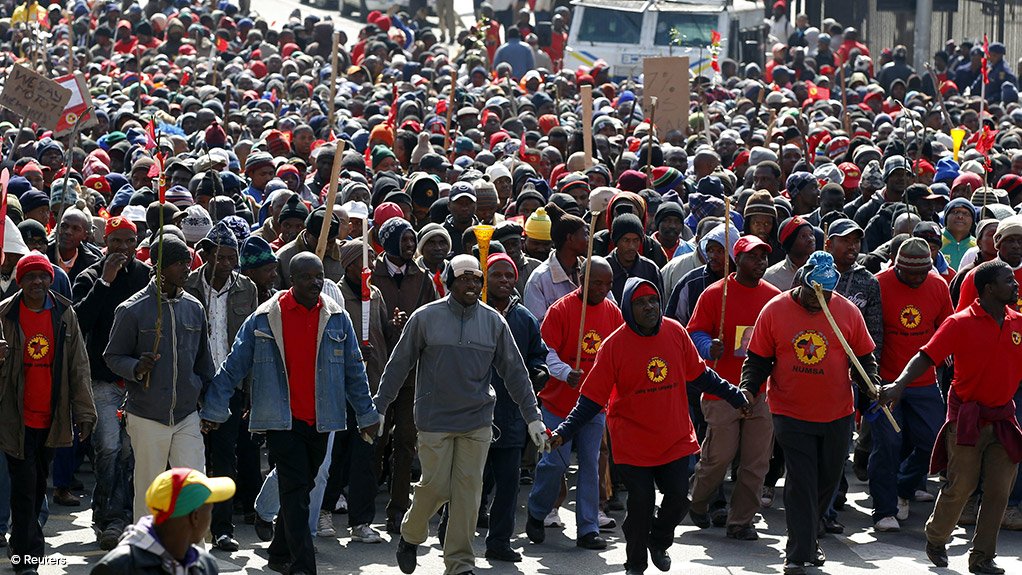Talks to end the three-week strike in the metals and engineering sector will resume this week through formal bargaining council structures after the Steel and Engineering Industries Federation of Southern Africa (Seifsa) was unable to secure a wage agreement with the National Union of Mineworkers of South Africa (Numsa).
The union’s rejection on Sunday of Seifsa’s latest offer of a 10% wage increase for 2014, followed by increases of 9.5% and 9% in 2015 and 2016 respectively, had led the employer body to withdraw its offer.
The employer body immediately reinstituted an earlier three-year offer of 10% in 2014, 9% in 2015 and 8% in 2016 for Rate H workers, and 8% in 2014, 7.5% in 2015 and 7% in 2016 for Rate A workers.
Numsa was demanding a 10% increase every year for the next three years, a housing allowance and a ban on the use of labour brokers.
“Regrettably, our genuine efforts to bring the strike to an end as soon as possible were not successful,” Seifsa CEO Kaizer Nyatsumba said in a statement on Wednesday.
Seifsa would now move to end the current impasse in the wage negotiations through facilitated discussions with all stakeholders, including other unions and employer bodies in the industry, under the auspices of the Metal and Engineering Industries Bargaining Council.
The council, which had scheduled a facilitated plenary session to take place this week, believed that Seifsa had “spent a considerable amount of time” in talks with the leadership of Numsa, with “absolutely nothing to show for it”.
Meanwhile, Labour Minister Mildred Oliphant on Wednesday afternoon said she would meet with Numsa and Seifsa.
The impact of the Numsa-led strike, which cost the country more than R300-million a day in the metals and engineering sector alone, had spilled over into other related sectors, including auto manufacturing, inflicting “even more damage” to the economy.
Vehicle manufacturers have started halting assembly at some plants as car component supply was interrupted.
Toyota, which maintained full production for the first 14 days of the strike, owing to contingency build-up, shut down two production lines on Tuesday, while Ford’s Pretoria plant was also impacted as from Monday.
Mercedes-Benz continued production at its plant; however, supplies were "critical".
Reports have also emerged that component shortages have hit output at Nissan.
General Motors South Africa had lost ten days of production at its main South African assembly plant, in Port Elizabeth.
BUILDING SECTOR
Meanwhile, Master Builders South Africa (MBSA) warned that the potential delays to operations in the building industry, on the back of a mounting shortage of building materials, could well be the “last straw” for many struggling contractors.
MBSA executive director Tumi Dlamini said in a statement that the strike had caused a “major disruption” in the supply of essential building materials to contractors already operating on “extremely small” profit margins.
“Work has slowed down substantially on building sites as MBSA members are deprived of essential building components, such as steel plates, framework, pipes, windows and doors, or any other metal component produced by factories affected by the Numsa strike.”
MBSA said the plumbing industry has reported “critical” shortages of geysers, while the piling sector, which relied heavily on steel reinforcement for foundation work, was struggling to get supplies.
Further, the aluminium sector was struggling to supply building contractors with materials for windows, fenestration and cladding.
“MBSA strongly believes it is time that the government intervened, particularly in light of the incidents of violence that have marred the strike – and the devastating spin-offs the strike in the metals sector is having on the rest of industry and the morale of the country as a whole,” Dlamini stated.
Further, MBSA noted that intimidation was taking place outside several factories and strongly condemned the violence in the strike action.
In response to reports of strike-related violence, trade union Solidarity on Wednesday launched a special SMS number and an email address for reporting incidents.
Solidarity would regularly make contact with employers and the police regarding incidents that were reported.
EMAIL THIS ARTICLE SAVE THIS ARTICLE
To subscribe email subscriptions@creamermedia.co.za or click here
To advertise email advertising@creamermedia.co.za or click here











